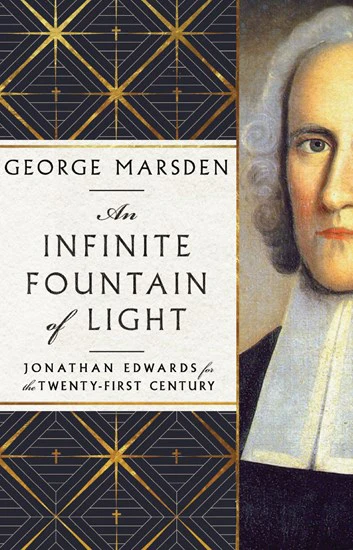
George Marsden
Reviewed by: Harrison Perkins
An Infinite Fountain of Light: Jonathan Edwards for the Twenty-First Century, by George Marsden. IVP Academic, 2023. Hardcover, 176 pages, $22.68 (Amazon). Reviewed by OP pastor Harrison Perkins.
A major obstacle against being interested in history is seeing why it matters today. For good or for ill, we easily gravitate to what seems relevant and dismiss what seems impractical. George Marsden is a seasoned historian of American Christianity, having written extensively on the nature of American evangelicalism and two biographies of Jonathan Edwards, who has produced a new volume trying to overcome exactly that obstacle by reflecting on what value Jonathan Edwards has for the twenty-first century.
The book is first notable for its readability and accessibility. I made it through the whole volume almost entirely in one sitting. Although Edwards is a notoriously challenging theologian, Marsden avoids ever getting caught in the overcomplicated brambles of Edwards’s thought, presenting a remarkably smooth commentary on certain aspects of his theology, along with some pointers about how they help us think about our world today.
The second thing to note is that this book would make an incredibly useful first foray into studying Edwards. I wish that I had this concise presentation of Edwards’s life, ministry, and key aspects of his theology when I first tried to learn something about him. Sometimes too many details can leave us lost as we try to get a basic orientation of a major figure like Edwards. Marsden provides a nearly perfectly balanced big-picture overview of Edwards’s life and accomplishments, tackling some of his most famous insights without pressing us into his more controversial ideas.
What can we learn from Edwards’s thought? One of the more fascinating aspects of Marsden’s little book is the picture he paints of early American life, specifically its religious contours. Even as he describes eighteenth-century American Christianity, however, we see seeds of modern evangelicalism in America too. We might easily think that the personality-driven, megachurch phenomena happened somewhat accidentally in the development of American history. The early days of the American ministries of George Whitefield and John Wesley, however, demonstrate the “self-made man” persona, wherein the church’s formal structures and policies were discarded, substituting attempts to gain popular attention for the ordinary means of grace.
The background to our modern American religious mindset might be clearest in Marsden’s reflections on Edwards’s views of the religious affections. Edwards’s revivalist version of Calvinism necessitated a highly experiential conversion narrative to demonstrate someone’s regeneration. This experience centered on intense emotions, which were key in proving the reality of faith. We see in Edwards the centrality of emotional experience that is so key in broader evangelicalism. We also see the root of the idea that faith must itself be affectional to be saving. The Presbyterian commitment to a credible profession of faith seems lightyears away.
Although this reviewer may not follow Marsden about what ought to be, this book is invaluable in showing why our situation is what it is.
April 21, 2024
5 Puritan Women: Portraits of Faith and Love
April 14, 2024
How to Read and Understand the Psalms
April 07, 2024
March 31, 2024
My Grandmother Is Praying for Me
March 24, 2024
March 17, 2024
Safeguards: Shielding Our Homes and Equipping Our Kids
March 10, 2024
© 2024 The Orthodox Presbyterian Church